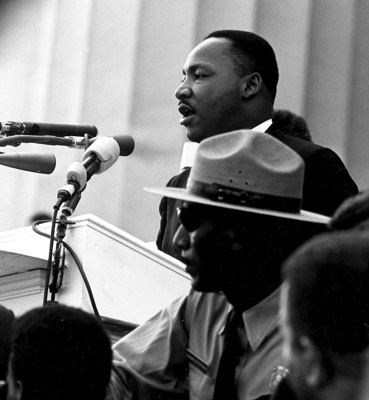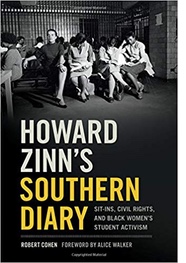Martin Luther King, Jr. Understood What Donald Trump Does Not

The hateful events of the past week – the anti-Semitic massacre in a Pittsburgh synagogue, the attempted bombing of two former presidents and other critics of President Donald Trump, the apparently racist murder of two African Americans in a Louisville Kroger’s after a failed attempt to invade a Black church – have provoked many Americans to consider the ways that Trump’s bigoted, violent rhetoric has poisoned our nation. It is true that Trump’s persistent appeals to racial and nativist prejudice and his skill at fanning white backlash and resentment paved the way for these ugly events. But beyond this, the hollowness of Trump’s vision of American greatness is now in plain sight, and yet it has not been remarked upon amidst the confusion, mourning, and anger of this past week.
 “Make America Great Again” was the central, and supposedly catchy slogan of Trump’s presidential campaign. But in the circus-like atmosphere of the 2016 presidential campaign, Trump was never pushed to explain what he meant by it. The closest the media came to getting an explanation was in a New York Times interview in which Trump waxed nostalgic for times of economic growth at the turn of the 20th century and of unquestioned American military power in the late 1940s and 50s when “we had just won a war.”
“Make America Great Again” was the central, and supposedly catchy slogan of Trump’s presidential campaign. But in the circus-like atmosphere of the 2016 presidential campaign, Trump was never pushed to explain what he meant by it. The closest the media came to getting an explanation was in a New York Times interview in which Trump waxed nostalgic for times of economic growth at the turn of the 20th century and of unquestioned American military power in the late 1940s and 50s when “we had just won a war.”
Whether worshipping mammon or the military, Trump’s nostalgia was virtually barren of concern for social justice and the challenge of eliminating racism, prejudice, and religious intolerance in the United States. Indeed, he seemed blind to the fact that the American eras he idealized were marred by Jim Crow racial segregation in the South and racial discrimination in the North (which Trump and his father had been guilty of practicing in New York City in their whites-only apartment house properties). And to glory in US military power, coming out of World War II, without acknowledging the human costs of that war (at least 50 million dead) or the tragedy of America’s failure to open it doors as a refuge to the millions of Jews who would die in Hitler’s death camps bespeaks both historical ignorance and moral callousness.
Even as a senior citizen, Trump has yet to acquire the historical knowledge or moral authority to grapple seriously with the question of American greatness. Martin Luther King, Jr., in contrast, was just in his early thirties at the time of the historic March on Washington of 1963 (less than half Trump’s current age), and had lived the struggle for racial justice since the Montgomery bus boycott of 1955. King understood the history of the United States as Trump never has.
King’s iconic “I Have a Dream” speech spoke directly to the question of American greatness. Though King had lived through the era of post-war power that Trump imagines had made America great, the civil rights leader displayed none of Trump’s nostalgia for that era since King knew that the injustice of racial segregation and discrimination, vast economic inequality, and the blight of poverty marred the American past. That is why for King in 1963 American greatness still rested in the future (“And if America is to be a great nation”) when (he hoped) it would finally live up to the commitments the Founders made to equality and justice in the Declaration of Independence: “I have a dream that one day this nation will rise up and live out the true meaning of its creed: ‘We Hold These Truths to be self-evident, that all men are created equal.’ ”
In words that resonate powerfully in the wake of the terror and hatred we experienced this week in the Trump era, King back in 1963 envisioned a future in which “we will be able to transform the jangling discords of our nation into a beautiful symphony of brotherhood.” For King that symphony of brotherhood would be heard only after America dis-empowered its “vicious racists,” eliminated bigotry , discrimination, “the unspeakable horrors of police brutality,” the isolation of those residing on a “lonely island of poverty in the midst of a vast ocean of material prosperity,” and the restrictions on voting rights.
King also believed America could not be a great nation until it overcame its bellicose nationalism and violence. As a dedicated proponent of non-violence, King, in his historic Riverside speech against the Vietnam War in 1967, expressed outrage that through such wars and massive armaments the US had become the world’s "greatest purveyor of violence.” King worried that American militarism and its culture of violence were “injecting poisonous drugs of hate into the veins of people normally humane.”
When weapons of war are deployed by hateful Americans to massacre worshippers in synagogues and churches, and to mass murder young students in schools it is easy to see that King’s warnings have not been heeded. We are left with a president who thinks that the solution to such hate and violence is yet more guns, even implying that the Jewish congregation in Pittsburgh this week had been unwise not to have its own armed guards to defend its religious sanctuary from a murderous anti-Semite.
By the last year of his life, King realized that America was divided and sick, just as it is today, that to obtain greatness the nation had a very long way to go; it needed not some minor adjustments, not some Trumpian upswing in the GDP, but a “radical revolution of values” so that “machines and computers, profit motives, and property rights” would no longer be “considered more important than people,” and so that America could overcome “the giant triplets of racism, extreme materialism, and militarism.”
King’s path to national greatness is as moral as Trump’s is amoral; it reminds us that no matter how the stock market does, America will never be free or great so long as its violence, its racial and religious hatred go unchallenged, leaving America’s churches, synagogues, schools, concerts, and social clubs bloodied by mass murderers, wielding assault weapons. Only when we rise up to this challenge – with bigotry and easy access to assault weapons condemned and opposed rather than fostered by a gun-loving, white nationalist president – will America at last be on the road to greatness, where we will, as King put it back in 1963, “be able to speed up the day when all of God’s children, black men and white men, Jews and Gentiles, Protestants and Catholics … be able to join hands and sing in the words of the old Negro Spiritual: Free at last! Free at Last! Thank God Almighty we are free at last!”